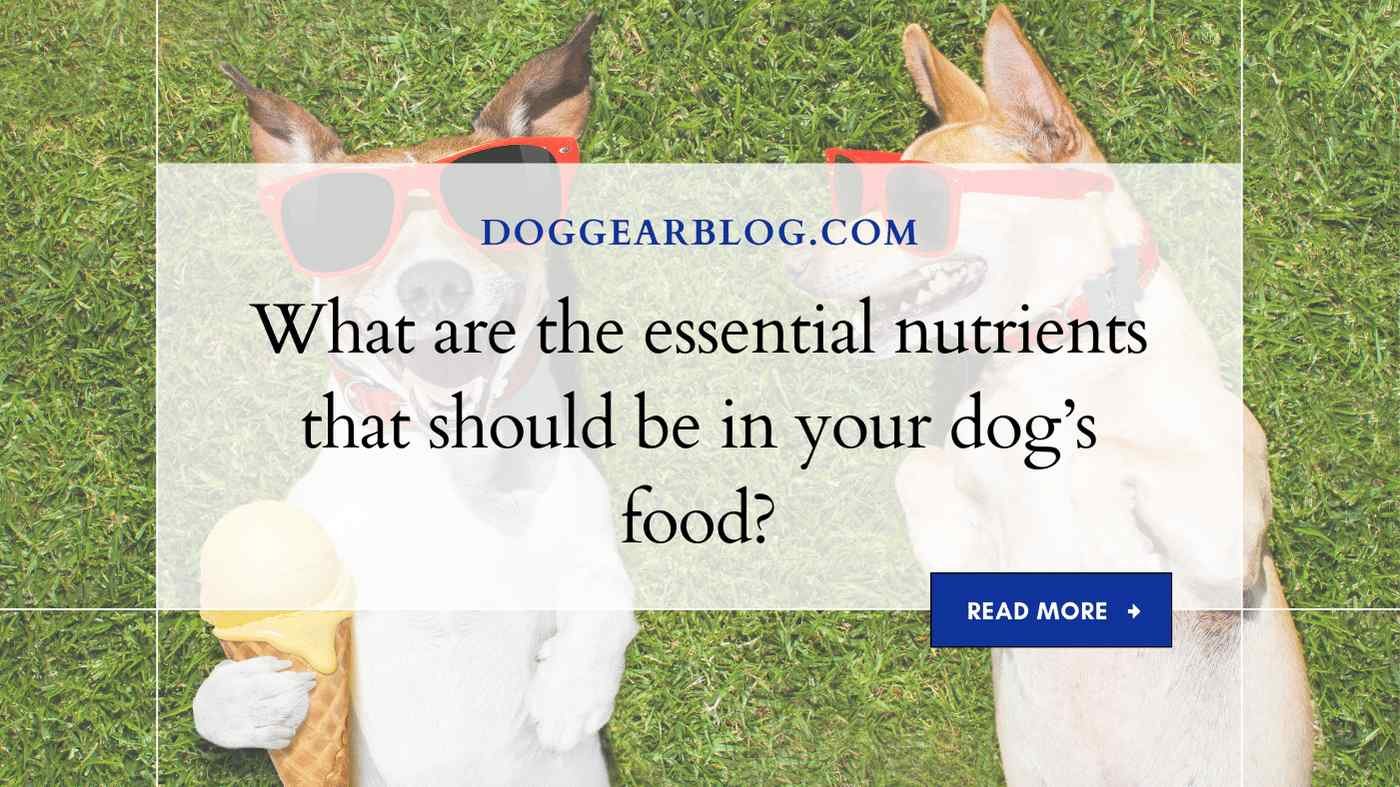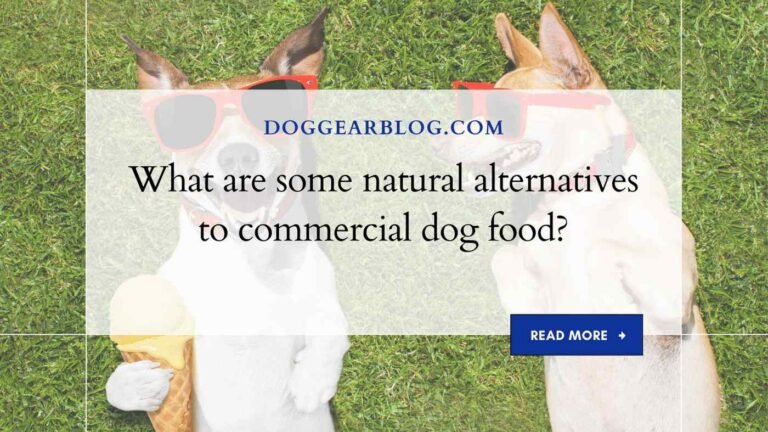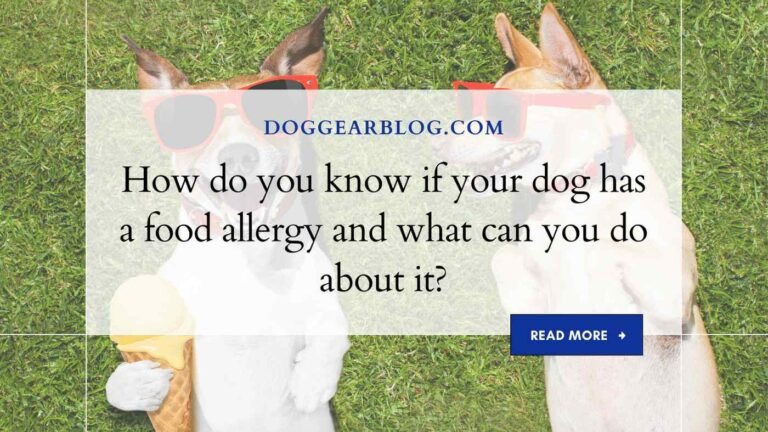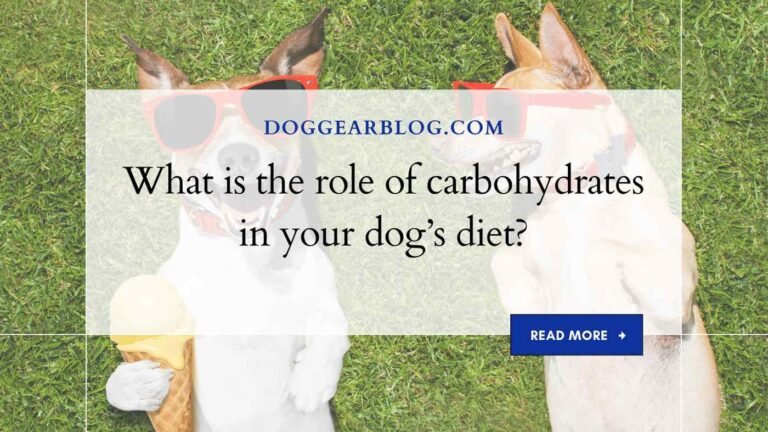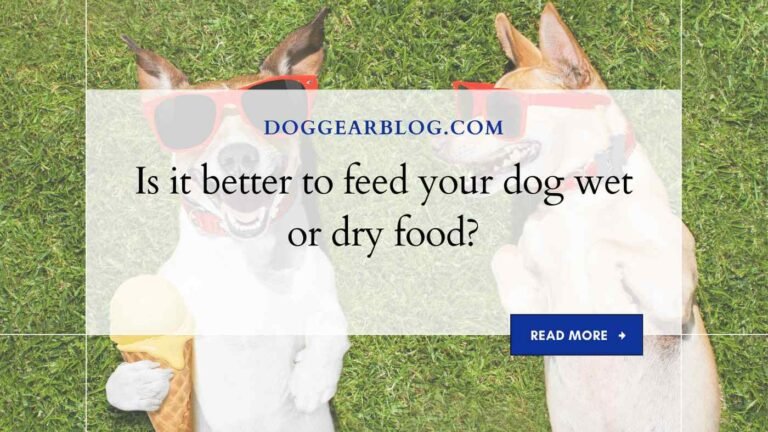What are the essential nutrients that should be in your dog’s food?
As dog owners, we all want to provide the best possible care for our furry friends. And one of the most critical factors in keeping them healthy is their diet. Just like humans, dogs need essential nutrients to maintain optimal health and wellbeing. But with so many pet food options available on the market today, it can be overwhelming to know which ones are truly nutritious.
In this blog post, we’ll explore what your dog needs to thrive and highlight some of the essential nutrients that should be included in their daily diet. So let’s dive into the world of canine nutrition and learn how you can give your pup everything they need!
What are the essential nutrients that a dog needs?

A dog’s diet should consist of the following essential nutrients: protein, carbohydrates, fat, vitamins, minerals and water. Each of these nutrients plays a role in the animal’s overall health and well-being.
Protein is important for the growth and maintenance of muscle mass. Carbohydrates are needed for energy production and to provide the body with glucose for other metabolic processes. Fat provides essential fatty acids (EFAs) that play significant roles in maintaining brain function, keeping skin soft and healthy, and aiding in the digestion of food.
Vitamins are responsible for helping to sustain the body’s cells and promoting healthy growth. Minerals are essential for many biochemical reactions within the body and help to keep bones strong. While all dogs need water, not all need the same amount or type of water depending on their size, activity level and dietary needs.
How much protein should a dog eat?
Based on size, most dogs should consume around 28 grams of protein per day. Some high-quality options for canine protein include meat, plant-based protein supplements, or dry dog foods that contain one or more meat sources.
What are the essential nutrients that can be found in human food?
Essential nutrients are materials that the body needs to function properly, but can’t produce on its own. The eight essential nutrients are found in all human foods, as well as in most dog food products.
The eight essential nutrients are:
Vitamin A
Vitamin B12
Biotin
Vitamin C
Calcium
Iron
Phosphorus
Potassium
What is a good daily intake of each essential nutrient for dogs?
There are many factors to consider when feeding your dog, including their age, activity level and weight. However, the general rule of thumb is that dogs need a diet that contains around 100-percent animal-based proteins, 20-percent moisture and 5-percent carbohydrates.
When you’re looking to feed your pup gut-healthy ingredients, make sure to include probiotics and prebiotics in their food. Probiotics help keep gut bacteria in check and can improve digestion by acting as a natural yeast inhibitor.
Prebiotics feed the probiotics and help create “good” bacteria in the intestine. Both of these essential nutrients are found in raw ingredients like fresh fruits and vegetables, as well as probiotic supplements like Ultimate Pet’s ProBiotic2 digestible tablet for cats or dogs.
Here are the daily essential nutrients your pooch may benefit from:
1) Animal-based proteins: This includes items like meat, poultry, fish, eggs and dairy products. Dogs need around 25 grams per day on average.
2) Moisture: One cup of dry dog food usually contains about 28 grams of moisture which is necessary for canine nutrition. An added bonus? Moisture helps keep food fresher for longer and prevents smells from piling up inside your pet’s bowl.
3) Carbohydrates: A small amount of carbs (less than 5%) is necessary for energy production, but too many can cause weight gain or GI problems in pets.
4) Fiber: Whole grains, fruits and vegetables provide your dog with essential vitamins, minerals and antioxidants as well as fiber. Shoot for around 25 grams of fiber per day.
What are the essential nutrients that should be in a dog’s food?

A well-rounded diet for a canine should provide the essential nutrients that keep them performing optimally. These nutrients include proteins, fats, minerals, vitamins, and water.
Proteins: A high-quality human-grade protein source is what most experts recommend when feeding dogs their food. Proteins help to maintain muscle mass, regulate body temperature, and play a role in healthy blood clotting.
Fats: All dog food products are required by law to have some level of fat in them. Fat provides energy for the animal and helps control moisture levels in the coat. Good choices of oils include Omega 3’s and Omega 6’s which can be found in some canine foods such as Beneful or Wellness Dog Food.
Mineral Sources: All dogs require trace mineral substances to function properly both physically and mentally. A good mineral list will include calcium (for strong bones), phosphorus (to make muscles and tendons), sodium (needed for fluid balance), potassium (essential for nerve function) and magnesium (essential for maintaining muscular activity).
Some good plant-based sources of minerals are flourless baking powder, kelp granules or tablets, pumpkin seeds, Romano cheese, etc. Be sure to read the ingredients panel before selecting a pet food product!
Vitamins: Dogs need an adequate number of vitamins to support their overall health including thiamin (B1), riboflavin (B2), niacin (B3), vitamin B12, biotin, and pantothenic acid. Some good plant-based sources of vitamins for dogs include spinach, kale, collard greens, alfalfa hay, navy beans, etc. Be sure to read the ingredients panel before selecting a pet food product!
Water: Dog food is designed to provide about 10% of the daily recommended value of water for adult dogs.
Choosing the right brand and type of pet food is important for your dog’s well-being. A good brand to consider is Orijen which is a human-grade food made specifically for dogs.
What are some foods that have high levels of each essential nutrient?
Some foods that have high levels of each essential nutrient are as follows:
beneficial for your dog’s overall health – liver, beef, lamb, salmon, spinach
- liver, beef, lamb, salmon, spinach good for his coat – pumpkin, peas, carrots
- pumpkin, peas, carrots packed with flavor – chicken breasts, turkey breast , beef, lamb, pork
- chicken breasts, turkey breast, beef, lamb, pork essential for his teeth and gums – salmon, ground flaxseed
Are there any supplements that can provide the necessary nutrients for my dog’s diet?
There are many supplements that can provide the necessary nutrients for a dog’s diet, but it is important to be aware of potential health risks associated with taking these supplements. Some essential nutrients that should be in a dog’s food include proteins, carbohydrates, vitamins, minerals, and water.
Proteins: Proteins are vital for the body and provide energy for the animal. Dogs need 12-16% of their calories to come from protein. The best sources of proteins for dogs include meat, poultry, fish, eggs, and nuts.
Carbohydrates: Carbohydrates are essential for the body and play an important role in energy metabolism. Dogs require 24-36% of their calories from carbs. The best sources of carbohydrates for dogs include grains (like wheat or corn), vegetables (like potatoes), fruits (like apples or bananas), and legumes (like beans or lentils).
Vitamins: A variety of vitamins are necessary for dogs including thiamin (B1), niacin (B3), pantothenic acid (B5), vitamin B12, vitamin D3, calcium pantothenate, manganese sulfate, choline chloride, and biotin.
Minerals: Minerals are essential for the body and help to create hormones and other biochemical substances. Recommended amounts of minerals vary depending on the specific mineral but most dogs need trace amounts of 40-60 different minerals. The best sources of minerals for dogs include meat, poultry, fish, eggs, and nuts.
Water: Water is essential for the body and must be included in a dog’s diet. Dogs need about 55% of their water from consumable sources such as water, food, and drinks.
Conclusion
There is no one-size-fits-all answer to this question, as the essential nutrients that your dog needs will vary depending on his size, age, and activity level. However, a good starting point would be to make sure that your dog’s food includes a decent amount of protein (around 25 percent), healthy fats (including Omega 3s and 6s), and carbohydrates.
By following these guidelines, you can help ensure that your dog’s body is receiving all the essential nutrients it needs to function healthily.
